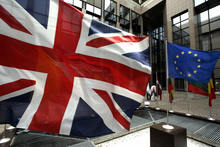 Last night in a speech at the IISS, David Milliband laid out the case against the Tories’ Europe policy. As he started off saying: “It is very strongly in the British national interest for the EU to develop a strong foreign policy; that to be frightened of European foreign policy is blinkered, fatalistic and wrong; that Britain should embrace it, shape it and lead it.”
Last night in a speech at the IISS, David Milliband laid out the case against the Tories’ Europe policy. As he started off saying: “It is very strongly in the British national interest for the EU to develop a strong foreign policy; that to be frightened of European foreign policy is blinkered, fatalistic and wrong; that Britain should embrace it, shape it and lead it.”
In that one sentence lies the case for Britain’s role in shaping a liberal, open and outward-focused EU. It is probably also the line of attack that the Foreign Secretary will use against the Tories until election day and possibly beyond, if Miliband eventually assumes the Labour leadership.
I have never made a secret of my support for the EU. I am strong believer in the nation-state and have no truck with those who wish to create a federal Europe. But I don’t think this is a real prospect, or threat, any longer. Don’t believe me? Listen to what Jose Manuel Barroso or Javier Solana say. They are clear that “ever closer union” is as far off today as a return to mercantilism.
To some, being EU-friendly must mean either suffering from “false consciousness” or being bamboozled by a chimerical EU beast. But, if you believe that, you will believe anything. The truth is far more prosaic. I simply think that Britain (and France and Germany) will have to cooperate more if they want to shape developments in the modern world. Not give up their views, but collaborate. In his IISS speech, the Foreign Secretary laid out exactly the kind of reasons why someone would want to back a global role for the EU. Not to create a super-state, but to safeguard our stake in the world.
Now there are limits to this argument, which Miliband only obliquely recognised in his speech. EU foreign policy cannot only be common; it has to be effective. Unfortunately, when the large EU states do not chart a course – which is the case on most issues, most of the time – the EU reverts to the foreign policy type of its smaller members. So it is timid in the face of electoral fraud in Albania; unwilling to boycott the “Durban II” World Conference against racism; and slow to follow up its rhetoric against Zimbabwe’s Robert Mugabe with action.
The point is: The EU can have a foreign policy of sorts, but the EU will have to focus on delivering foreign policy results. Having a common position on Russia or China only works if the position is right and strong. Put simply: common but weak is not good enough if the EU is to become a global player.
There are, of course, counterarguments to this EU-friendly view. The first one is that the EU’s foreign policy clout comes at too high a democratic price for the EU states. That’s a matter of viewpoint. I think Britain has been more influential in steering EU foreign policy than most people realise. So I am not worried.
The second argument is that the EU gives strength in size, but size matters less these days. That’s basically what William Hague said in the Daily Telegraph recently. I agree size is not enough. It rarely is. But in dealing with China and Russia, size does matter. The question is how best to achieve it. As the Foreign Secretary says: “Get our act together and make the EU a leader on the world stage; or become spectators in a G2 world shaped by the US and China.”
Britain’s Europe debate has often been characterised by two caricatures – one side arguing all the world’s benefits come from the EU, the other that the Union is the fountain of all ills. Hopefully, a more sanguine debate, at least on foreign policy, can begin.






Comments